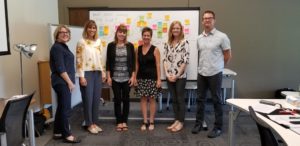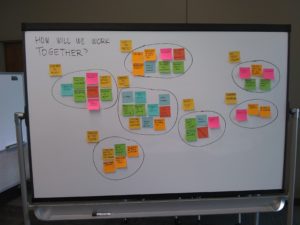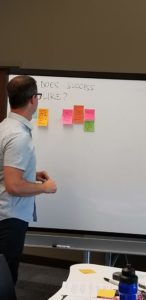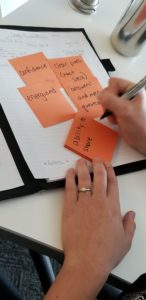Five days. That’s all the time it took for a group of dedicated representatives from Carizon Family and Community Services to start thinking of new ways to become more ‘family focused’ when it comes to serving their clients.
The Kitchener-based non-profit organization has a mission to assist local children, youths and families thrive through a variety of programming and services but identified – thanks to a new Capacity Canada program focused on design thinking called Capacity by Design – that improvement was within reach.
“Social services can be complicated. As support providers, it can be difficult to meet the expectations of those we support, as well as the expectations of those that support us,” said Jonatan Ulloa, student support worker with Carizon.
To find a way to better meet these needs, in September Ulloa and eight of his Carizon co-workers took part in a five-day design sprint which forms the core of Capacity by Design (www.capacitybydesign.ca).
Representatives from Carizon Family and Community Services participated in Capacity by Design’s inaugural design thinking sprint in September.
The new program is being offered in a partnership between Capacity Canada and Overlap Associates, a Kitchener-based leader in the human-centred approach of design thinking to solve problems.
The Carizon sprint was the first of 40 planned over the next four years, with the first six sprints being held by April 2019. Funding for the program came last March courtesy of a $1.1 million commitment from the Lyle S. Hallman Foundation.
Overlap Associates experts, who are spending this first year of the program teaching the Capacity by Design team the ins and outs of design thinking, led the Carizon sprint.
Liz Dennis, a key designer for the Capacity by Design team, which also includes retired Wilfrid Laurier University marketing professor Hugh Munro, said she was impressed by how Overlap Associates handled the inaugural sprint.
“They were skillful about knowing when the group needed a break and provided a diversity of activities that kept the group actively participating in the process through all the stages,” she said.
Consultation with Capacity by Design facilitators prior to the actual sprint lead to the identification of a key issue the Carizon team wanted to tackle, which was determining what being more ‘family focused’ meant to the people it serves.
In effort to help them build possible prototypes towards finding a solution, the Carizon participants went out into the field to various sites the non-profit operates to meet with clients, staff and community members to get their feedback via a series of short interviews and one-on-one interactions.
“Building a prototype of a physical product can be challenging enough but when it is a potential service or experience that is being built, it takes extra effort and stretch of the imagination,” said Munro.
Dennis said the ‘field trips’ greatly helped participants work towards viable solutions.
“It had a real impact on some of the sprint team, particularly those who are in management roles as they don’t normally get to connect directly with clients,” she said.
Among these managers was Carizon Chief Executive Officer Tracy Elop, who said having half a dozen conversations with clients gave her some new perspectives.
“The richness of the data we got back has really stuck with us,” she said, noting the process of setting up these interactions ahead of time wasn’t even necessary.
“All we did was identify some potential opportunities,” she said.
For Ulloa, the experience of talking with clients had a great impact on him both professionally and personally.
“Hearing the stories of the people in the community that crossed the gamut from uplifting to very difficult, ignited a desire in me to listen, understand, and use the information as a building block to the ideas we would later prototype,” he said.
Following these interactions and interviews, the Carizon team returned and used post-it notes to build possible solutions, which Elop said included defining what ‘family focused’ meant.
“This was just a starting point. We came up with three pretty tangible ideas,” she said. “I think we’re now in a good place.”
Ulloa agreed said in the days following the sprint they already began looking at ways to incorporate what they learned into new projects.
“I believe the impact we’re feeling right now is one of reinvigoration; a new way to look at solving issues that we are facing,” he said.
For his co-worker Shannon Nicholson, Carizon’s director of clinical counselling, said the sprint has had a noticeable effect.
“It has given me a new enthusiasm for looking at things differently, asking more questions and really being open to diving in and trying something new,” she said. “I think the sprint gave us a new level of energy around our organizations, our clients and the work that we do.”
Nicholson also said she sees the value of design thinking and what it can accomplish.
“I think design thinking could help the non-profit sector to generate new ideas, new
ways of thinking and approaching problems, and support taking small risks and trying something new,” she said.
Elop agreed and said she wished more frontline people from her organization could have been involved in the sprint.
“We were very management heavy in our group,” she said. “But all of them were really interested in learning about this.”
Nicholson said she wished there had been more time.
“I would have loved more time to flush out more of our ideas, but I appreciated the fast-paced and condensed version we were led through,” she said.
Dennis said changes are in the works for the next sprints and that Capacity by Design is still a new program.
“In future sprints we’ll also be looking at trying out different design thinking tools, as this is Capacity by Design’s year to learn about the array of tools available and how we can best apply design thinking to the social good sector,” she said.
The next sprint, which wraps up Oct. 26, is helping out Extend-A-Family Waterloo Region.
For more information on Capacity by Design, contact Liz Dennis ([email protected]) or Hugh Munro ([email protected]).

